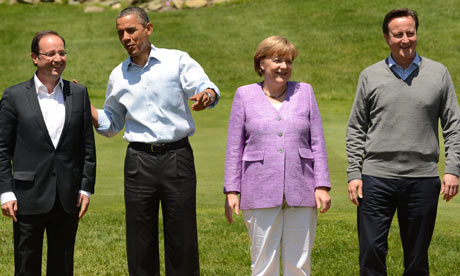
From Daryl Lindsey, Spiegel: The European Union and United States say they will soon begin negotiations to create the world’s largest free-trade zone. German editorialists argue a deal is necessary if the West wants to help shape global politics and address the challenge of a rising China. . . .
US President Barack Obama and German Chancellor Angela Merkel both believe this figure could be increased significantly, adding some much needed economic stimulus in America and Europe. . . .
In Brussels, European Commission President Jose Manuel Barroso has described the potential deal as "ground-breaking … a game-changer" — and it is one that wouldn’t cost a cent.
Together, the US and EU want to boost their economies, jobs and present a united front against the growing economic strength of emerging superpower China. . . .
Center-left Süddeutsche Zeitung writes:
"The project is extremely ambitious, with some Atlanticists already speaking of an ‘economic NATO‘. That term isn’t totally out of place either. The NATO military alliance was once established to protect against the threat of the Soviet Union. The idea of a new economic alliance also has found so many supporters because the old industrialized nations fear that they are falling behind the emerging economic power of China. The fact that negotiations are even taking place is a success for German Chancellor Merkel, who has been pushing the project for years despite an initial lack of interest in Washington. Obama’s economics team also held off for a long time because his advisors felt the initiative would be too complex. . . ."
The EU is now getting a future-oriented project that will allow it to look away from its own problems as well. A free-trade agreement would further open the Continent and could also foster trust between the Americans and Europeans and set standards for the rest of the world. It’s worth using all of our energy to promote an economic NATO. . . ."
Conservative Die Welt writes:
"[A] common market would also send a powerful political message: Namely that the West wants to pull more tightly together to face the challenges coming from emerging powers in other parts of the world. Given America’s current weakness in leadership, it is also necessary. Otherwise, Obama’s speech had a clearly isolationist character. …. Only when the country’s economic foundations are healthy again can (America) assume a global leadership role (Obama suggested)."
"This means that the trans-Atlantic free-trade zone at the same time has both economic and political significance. It is aimed at helping Europe and the United States recover economically. But it also makes clear that only an en ever-closer West can succeed in decisively helping to determine global policy. Given these considerations of overriding importance, the free-trade zone cannot be allowed to fail over niggling details." (photo: Michael Reynolds/EPA)
Image: epa%202%2014%2023%20Hollande-Obama-Merkel-Cameron.jpg
